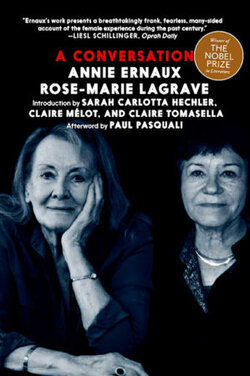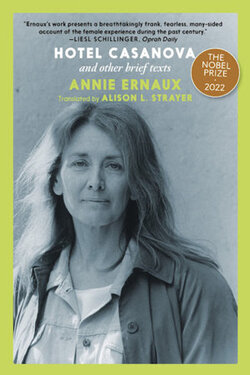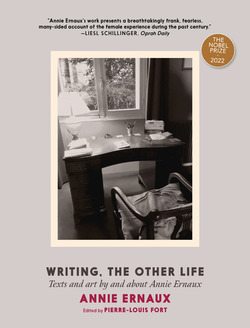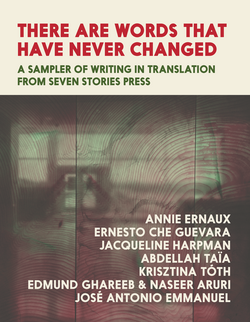“Originally published as part of a French series inviting authors to compose 'the letter they'd never written'—after Franz Kafka's letter to his late father…. Ernaux is 10 when she overhears her mother talking about another daughter, one who died at 6 of diphtheria…. No matter how slim, though, Ernaux's books are not chapters, but volumes; bundling them as a single story ignores the texture of recurrence…. One pivotal, painful memory at a time, Ernaux evaluates her life. A central question: Why would she, a country girl with grandparents who never learned to read, choose to write? In book after book, there is another stab at an answer…. The book's ghostly subject and epistolary form provide Ernaux with yet another origin story…. Economically and poetically, Ernaux traces not only the discovery of this bizarre secret, but the ways in which knowing and not speaking it (never once, to either of her parents) has impacted her, universalizing the emotion of something incredibly specific.”
– Natasha Stagg, The New York Times Book Review
“In this gently heartbreaking account, Nobel Prize winner Ernaux reflects on the death of her older sister, Ginette, in 1938, two years before the author was born. Months before the diphtheria vaccine was made compulsory in France, six-year-old Ginette died of the disease. Taking inspiration from Franz Kafka’s Letter to His Father, Ernaux addresses her late sibling directly, compiling all she knows of Ginette’s life, death, and legacy into a diaristic dossier. Though Ernaux’s parents never spoke of Ginette, the author tracks down and interviews the few living people who remember the girl’s death, seeking to map the devastation it wrought on her family before Ernaux was born. Elsewhere, she recalls hearing adults call Ginette a “nice” girl and Ernaux a “demon,” which saddled her with lifelong feelings of inadequacy, and makes a number of poignant literary allusions, comparing her late sister to Peter Pan and Jane Eyre’s tuberculosis-stricken Helen Burns. Poetic and raw but never maudlin, this beautiful meditation on a very particular kind of grief will resonate with anyone trying to process a major loss of their own.”
– Publishers Weekly, starred review
“Ghost story.
Invited to contribute to a collection of imagined letters, Nobel Prize winner Ernaux addresses the sister she never knew. She was 10 when she overheard her mother disclose to a friend that Annie was not her first child. There had been another daughter, who died of diphtheria in 1938 when she was 6. “She died like a little saint,” her mother said. And “she was nicer than the other one.” The other one being the daughter born two years later: Annie. The idea of her dead sister haunted Ernaux throughout her childhood and haunts her still. Growing up, she never asked her parents, relatives, or family friends about the girl, whose name, she learned, was Ginette. She saw no photos of her until, when she was 18, she found a cache hidden in the attic, in a box accidentally left open. Because her parents were clear that they wanted only one child, she understood that her existence had depended on her sister’s death. “I was aware of my advantages as an only child,” she admits, “a child born after the death of another, the pampered object of a worried solicitude.” She had been a delicate child, and when she was 5, a cut from a rusty nail gave her tetanus. Her mother, frantic, dosed her with water from Lourdes. “I had to come to terms with this mysterious contradiction,” she reflected later: “you, the good girl, the little saint, were not saved, and I, the demon, survived. Not only survived, was miraculously saved.” Ernaux sees her letter to Ginette, then, as a way to “repay an imaginary debt by giving you, in turn, the existence your death gave me”—or to exorcise a spirit.
A moving reflection on a profound loss.”
– Kirkus Reviews
“Ernaux won the 2022 Nobel Prize in literature for a body of work so resistant to labels, it fell to the French writer to coin one herself: "autosociobiography," a hybrid genre woven from memoir, fiction, history and criticism. It's an ironically long, unwieldy name for books that have been noted for their deft grace and, frankly, their tendency to be quite short. Coincidentally, both qualities are on display in The Other Girl, which clocks in at fewer than 100 pages — and which weaves its story through a letter addressed to an older sister who died before Ernaux was born. First published in French in 2011, the book comes to anglophone readers courtesy of Strayer, whose translation of Ernaux's The Years earned a nod from the 2019 Booker International Prize.”
– Colin Dwyer, NPR
“Like the two girls merging in the white of their dresses in a photo from the 1930s, like the two sisters mirroring each other in the memories of an aging parent, like the baby photo that feels like a hologram on the first page, Ernaux is interested in the merging and doubling of images. There is the image of memory, which proves piercing yet also corrupted by time and ego, and the images of photography and film, which don’t always match memory but nonetheless remain fixed. . . .What Ernaux is often writing about in her books is what Virginia Woolf describes as “moments of being,” rare instances in one’s life when one is fully alive, a stark clarity opposed to the mundane and monotonous.”
– Sarah McEachern, Los Angeles Review of Books





























